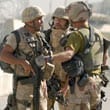For several days, the front pages of our leading newspapers have been filled with stories about how NATO allies bombed two fuel tankers in Afghanistan and accidentally killed some innocent bystanders.
The strike, ordered by a German commander and implemented by an American pilot, was “the deadliest use of German military force since World War II,” according to the Christian Science Monitor. And this has “injected an intense, emotional debate about the war” into a German election. It has preoccupied us, too.
Here’s how a recent page-one story began in the Washington Post (Sept. 5). When you read it, pretend it is 1944 and for “northern Afghanistan” read “Germany”:
The allies “launched an investigation Friday into a predawn airstrike in which an American fighter jet bombed two hijacked fuel trucks in northern Afghanistan, killing scores of people and prompting accusations that many of the dead were civilians.”
If I were General McChrystal, the top U.S. commander in Afghanistan, I would ask: How are we to distinguish “civilians” from “insurgents”? (“Insurgent” is the new polite word for the enemy.) Are we to assume that anyone not carrying a rifle is a civilian? Can we ask the UN to proclaim that combatants should clarify matters by wearing uniforms?
In Afghanistan today, we are expected to wage a nice-guy war against indeterminate bad guys and at the same time avoid collateral damage against those who may one day be on our side. Or maybe not. Their decision in that respect is understood to depend on how nice we are in the interim. (Are we helping to advance the cause of women’s rights, for example? We only have to spell out such conditionals to realize how absurd the whole situation is.)
Our NATO allies fight under even more restrictive rules. The Germans, for example, are not allowed to attack suspected enemy forces unless those forces first attack them. They are targets, in other words, but they are allowed to shoot back.
The U.S. has now invested its prestige in fighting a war against a country which is not really a nation but a collection of tribes who, when not united by a common external foe — such as the U.S., or before us the Soviet Union — would be at each others’ throats. Meanwhile we have enlisted the loyalty of tens of millions of Americans whose patriotism is engaged. They support the U.S. side with all the fervor of sports fan cheering on the home teams.
Most Americans no doubt recognize that the terms of engagement against today’s “insurgents” in faraway places are more restrictive than they were against Nazi Germany. But I doubt if they realize just how onerous and self-defeating the new rules have become.
Here I will skirt the question whether the U.S. ought to be in Afghanistan for geopolitical reasons, for reasons of prestige, or for any other reason. I will simply say this. Fighting a nice-guy war, in mountainous and extremely hostile terrain, where we cannot easily distinguish friend from foe, and where we are severely restricted in the way we use the weapons at our disposal, is a losing proposition.
The man most imperiled politically by this state of affairs is the President of the United States. It will be difficult for him to pull out of such a conflict, and (I believe) impossible for him to win it. As an interim measure, then, perhaps he should spell out publicly what the new rules of engagement are. That way, Americans citizens may more easily decide whether to support our continued involvement in such a conflict.
























